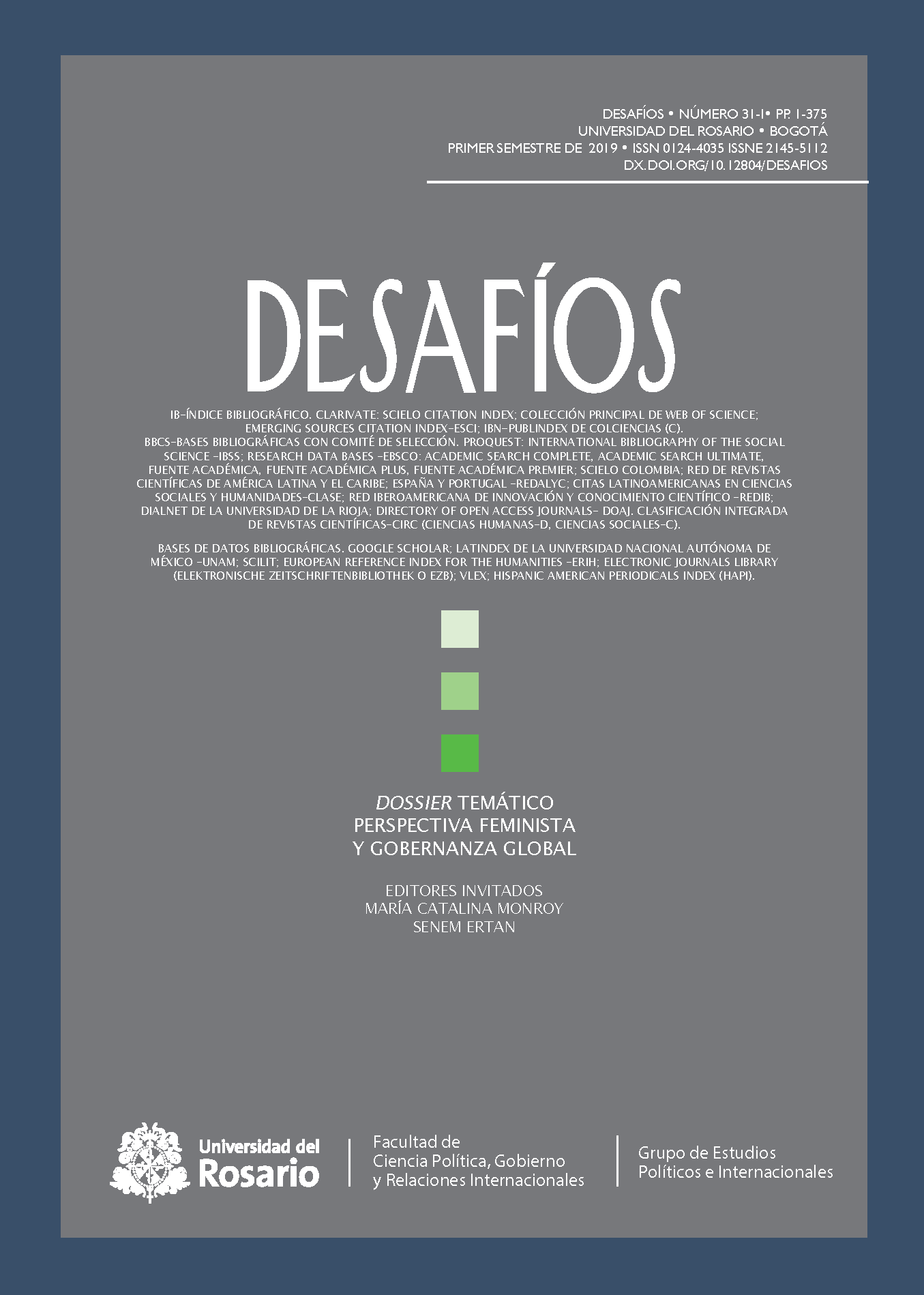Mujeres en liderazgo en el regionalismo latinoamericano
Barra lateral del artículo
Contenido principal del artículo
Documento de reflexión
Vol. 31 No. 01
Descargas
Abels, G. (2014). Gendering European Integration Theory. Opladen: Barbara Budrich Publishers.
Bianculli, A. (2016). Latin American regionalism. In T. Borzel & T. Risse (Eds.), The Oxford handbook of comparative regionalism (pp. 154-177). Oxford: Oxford University Press.
Börzel, T., Van Hüllen, V. & Lohaus, M. (2013). Governance transfer by regional organizations. Patching Together a Global Script. Basingstoke: Palgrave Macmillan.
Caldeirinha, C. & Horst, C. (2017). Women leading the way in Brussels. London: John Harper Publishing.
Childs, S. & Krooks, M. L. (2006). Should feminists give up on critical mass? A contingent yes. Politics and Gender, 2(4), 522-530. Doi: https://doi.org/10.1017/S1743923X06251146
Claus, V. A., Callahan, J. & Sandlin, J. R. (2013). Culture and leadership: Women in nonprofit and for-profit leadership positions within the European Union. Human Resource Development International, 16(3), 330-345. Doi: https://doi.org/10.1080/13678868.2013.792489
Costa, O., Dri, C., Stavridis, S. (Eds.). (2013). Parliamentary dimensions of regionalization and globalization: the role of inter-parliamentary institutions. Berlin: Springer.
Debusser, P. (2012). Gender mainstreaming in eu development policy towards la: Transforming gender relations of confirming hierarchies? Latin American Perspectives, 39(6), 181-197. Doi: https://doi.org/10.1177/0094582X12458423
Dri, C. (2009). At what point does a legislature become institutionalized? The Mercosur parliament’s path. Brazilian Political Science Review, 3(2), 60-97.
Friedman, E. J. (2009). Re(gion)alizing women’s human rights in Latin America. Politics & Gender, 5, 349-375. Doi: https://doi.org/10.1017/S1743923X09990171
Genovese, M. A. (Ed.). (1993). Women as national leaders. Newcastle: Sage Group.
Hoskyns, C. (2004). Gender perspectives. In A. Wiener & T. Diez (Eds.), European Integration Theory. Oxford: Oxford University Press.
Kantola, J. (2010). Gender and the European Union. Basingstoke: Palgrave
Macmillan.
Kantola, J. & Lombardo, E. (Eds.). (2017). Gender and the economic crisis in Europe: Politics, institutions and intersectionality. Berlin: Springer.
Korzeniewicz, R. P. & Smith, W. (2005). Transnational civil society actors and regional governance in the Americas: Elite projects and collective action from below. In L. Fawcett & M. Serrano (Eds.), Regionalism and governance in the Americas (pp. 135-157). Basingstoke: Palgrave.
Kronsell, A. (2012). ‘Gendering theories of European integration. In G. Abels & J. Mushaben (Eds.), Gendering the European Union. New approaches to old democratic deficits (pp. 23-40). Basingstoke: Palgrave Macmillan.
Krook, M. L., Mackay, F. (Eds.). (2011). Gender, politics and institutions: Towards a feminist institutionalism. Basingstoke: Palgrave Macmillan.
Krook, M., True, J. (2012). Rethinking the life cycles of international norms: The United Nations and the global promotion of gender equality. European Journal of International Relations, 18, 1103-127. Doi: https://doi.org/10.1177/1354066110380963
Lewis, J. J. (2018). Michelle Bachelet. ThoughtCo, Jun. 14, 2018, thoughtco.com/michelle-bachelet-3529298
Liebert, U. (Ed.) (2003). Gendering Europeanisation. Frankfurt: Peter Lang.
Mackay, F. et al. (2009). The feminist potential of sociological institutionalism. Politics and Gender, 5(2), 253-262. Doi: https://doi.org/10.1017/S1743923X09000208
Mackay, F., Kenny & Chappell L. (2010). New institutionalism through a gender lens: Towards a feminist institutionalism? International Political Science Review, 31(5), 573-588. https://doi.org/10.1177/0192512110388788
Madsen, S. R. (Ed.). (2018). Handbook of research on gender and leadership. Cheltenham: Edward Elgar Pub.
Malamud, A. (2014). Presidentialist decision making in Latin American foreign policy: examples from regional integration processes. In J. I. Dominguez & A. Covarrubias (Eds.), Routledge handbook of Latin America in the world (pp. 112-123). Abingdon: Routledge.
Malamud, A. (2016). Presidentialism and Mercosur: A hidden cause for a successful experience. In F. Lauresen (Ed.), Comparative regional integration: Theoretical perspectives (pp. 53-74). Abingdon: Rutledge.
Ngunjiri, F. W. & Madsen, S. R. (Eds.). (2015). Women as global leaders. Charlotte: Information Age Publishing.
Ngunjiri, F. W., Longman, K. A. & Cherrey, C. A. R. Madsen (Eds.). (2015). Women and leadership around the world. Charlotte: Information Age Publishing.
Ribeiro Hoffmann, A. (2014). Gender mainstreaming in Mercosur and Mercosur-eu trade relations. In: A. van der Vleuten, C. Roggeband & A. Eerdewijk (Eds.), Gender equality norms in regional governance: Transnational dynamics in Europe, South America and Southern Africa (pp. 117-138).
Basingstoke: Palgrave McMillan.
Ribeiro Hoffmann, A. & Roggeband, C. (2017). ‘Gendering EU-Latin America Inter-regional relations’. In T. Kruesssmann & A. Ziegerhofer (Org.), Promoting gender equality abroad. An assessment of eu action in the external dimension (pp. 163-189). Frankfurt: LIT Verlag.
Riggirozzi, P. & Tussie, D. (2017). Rethinking our region in a post-hegemonic moment. In J. Briceno Ruiz , I. Morales, (Eds.), Post-hegemonic regionalism in the Americas. Towards a Pacific vs. Atlantic divide, (pp.16-31). London and New York: Routledge.
Roggeband, A. (2015). Latin American advocacy on violence against women and the oas Convention. In A. van der Vleuten & A. van Eerdewijk (Eds.), Mapping gender norm dynamics. Gender, regions and norms: Debunking Eurocentrism (pp. 139-164). Basingstoke: Palgrave Mcmillan.
Rosamond, B. (2000). Theories of European integration. New York: St. Martin´s Press.
Sikkink, K. (2015). El papel protagonista de Latinoamérica en los derechos humanos. Sur Jornal, 22.
Tan, S. J. & DeFrank-Cole, L. (Eds.). (2018). Women’s leadership journeys: Stories, research, and novel perspectives. Abingdon: Routledge.
Thomas, S. (2003). The impact of women in political leadership positions. In S. Carroll (Ed.), Women and American politics. New questions, new directions (pp. 87-110). Oxford: Oxford University Press.
Tickener, J. A. (2002). Feminist perspectives on international relations. In W. Carlsnaes, T. Risse & B. Simmons (Eds.), Handbook of international relations (pp. 275-291). Newcastle: Sage Group.
Van der Vleuten, A. (2007). The price of gender equality. Member states and governance in the European Union. Aldershot: Ashgate.
Van der Vleuten, A. (2016). Social and gender governance. In Borzel & T. Risse (Eds.), The Oxford handbook of comparative regionalism (pp. 405-429). Oxford: Oxford University Press.
Zippel, K. (2004). Transnational advocacy networks and policy cycles in the eu: The case of sexual harassment. Social Policy, 11(1), 57-85. Doi: https://doi.org/10.1093/sp/jxh026
Detalles del artículo

Esta obra está bajo una licencia internacional Creative Commons Atribución-NoComercial 4.0.
Los derechos de autor serán de la Universidad del Rosario. Cuando el autor quiera publicar el manuscrito en otra publicación, deberá pedir a la Editorial de la Universidad del Rosario los permisos correspondientes. De igual forma, cuando la Revista esté interesada en publicar artículos que ya han sido publicados en otras revistas, procederá a solicitar los permisos correspondientes en la editorial donde se realizó la primera publicación. Bajo una Creative Commons Attribution License, los autores pueden compartir el trabajo con un reconocimiento de la autoría del trabajo y la publicación inicial en esta revista.



